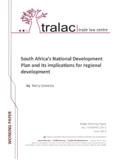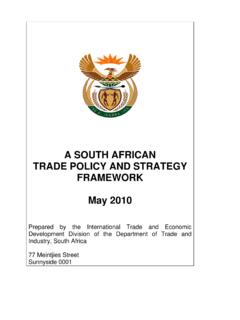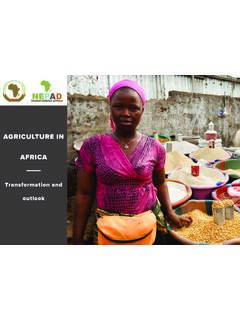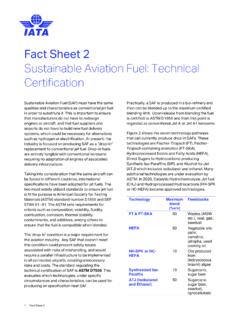Transcription of Analysis of Colonialism and Its Impact in Africa - tralac
1 ISSN 1712-8358[Print]ISSN 1923-6700[Online] CommunicationVol. 8, No. 3, 2012, pp. 46-54 Canadian Academy of Oriental and Occidental CultureAnalysis of Colonialism and Its Impact in AfricaStephen Ocheni[a]; Basil C. Nwankwo[b],*[a] Ministry of Foreign Affairs, Abuja.[b] Professor and Dean, Faculty of Management Sciences, Kogi State University, Anyigba, Nigeria.*Corresponding 12 March 2012; accepted 14 June 2012 AbstractThe work took a hard and critical look on the Impact of Colonialism and its concomitant ally, imperialism on the African state. The Analysis revealed that the present primary role of African states in the international world economy as the dominant sources of raw materials and major consumers of manufactured products are the results of long years of colonial dominance, exploitation and imperialism.
2 Consequently, on attainment of independence by most African states from their colonial overlords, it was extremely very diffi cult to disentangle from the colonial perfected role for the state because of the systematic disarticulation in the indigenous economy and the intrinsic tying of same with the external economy of the colonizers. The work also made a startling stark revelation by discovering through Analysis that the deep-seated corruption in most African states and the selfi sh behaviour of some of the political leaders to sit tight in offi ce even when they have obviously outlived their usefulness in the eyes of their people, are attributable to the effects of Colonialism and imperialism. The work concludes and recommends that for African states to overcome their present social, economic, political, health, education woes, etc.
3 , there is the urgent need for the people and the leadership to create their own indigenous identity, culture, technology, economy, education, religion, craft, etc. that would be interwoven in good governance. Key words: Colonialism ; Good governance; Impact ; African states and Europe Stephen Ocheni, Basil C. Nwankwo (2012). Analysis of Colonialism and Its Impact in Africa . Cross-Cultural Communication, 8(3), 46-54. Available from URL: : Colonialism is the direct and overall domination of one country by another on the basis of state power being in the hands of a foreign power (For example, the direct and overall domination of Nigeria by Britain between 1900-1960). The fi rst objective of Colonialism is political domination. Its second objective is to make possible the exploitation of the colonized we talk of Colonialism in Africa we are talking of phenomenon which took place between 1800-1960s.
4 It is a phenomenon which is part and parcel of another phenomenon called imperialism. In fact, Colonialism is a direct form of imperialism. This is why it is often said that all Colonialism is imperialism, but not all imperialism is Colonialism . Colonialism began as a result of changes in the mode of production in Europe (For example, the emergence of industrial revolution). The industrial revolution ushered in a new process of production in place of the earlier slave-based economy. The industrial revolution was a revolutionary trend in the history of mankind. The problem of how to lubricate machineries came up with the emergence of the industrial revolution. The slave trade and slavery have by this time fulfilled their basic function of providing the primitive capital. The quest for the investment of the accumulated capital and the need for raw materials led to the colonization of main focus of the study is on the Analysis of 47 Copyright Canadian Academy of Oriental and Occidental CultureStephen Ocheni; Basil C.
5 Nwankwo (2012). Cross-Cultural Communication, 8(3), 46-54colonialism and its Impact in Africa . The work will be examined under two broad headings. The first is the reasons for colonization of Africa and the strategies used to achieve the colonial objectives. The second is the impacts of Colonialism in Africa . There will also be conclusion/refl ections at the end of the FOR THE COLONIZATION OF Africa AND THE STRATEGIES Used to Achieve the Colonial ObjectivesThe colonization of Africa by European powers was necessitated by several factors. Notable, among the factors was the emergence of the industrial revolution which brought about a rapid change in the socio-economic transformation and technology of the European countries. The industrial revolution led to increase in production. The progress in the industry went faster than the progress in agriculture.
6 It was becoming increasingly hard or diffi cult for the agriculture to satisfy the demand for raw materials required in the industries. There was therefore, the need for the European powers, for example, the British to go outside the country to look for additional raw materials. Furthermore, as a result of the decline in agricultural production, there was the problem of how to produce enough or adequate food to feed the fast growing urban population. In other words, the rural areas in Britain for example, were fi nding it increasingly diffi cult to produce enough food to feed the increasing urban population. Similarly, there was also need for market, not only for the production of raw materials but for food to sustain the increasing population. As a result of rapid increase in technology, new products were produced at a faster rate than the populations could dispose of.
7 Africa with her large population constituted a ready market for such products. Furthermore, as result of low wages paid to workers, there was accumulation of profits by the industrialists at a faster rate than they could invest back. There was under-utilization of capital in Europe at this time, and a need to fi nd where these capitals will be transported and invested for the creation of new products. It was during this process of investment of the surplus capital that imperialism (1978, p. 35) while discussing the European conquest of Africa noted that when Europe pioneered industrial capitalism, her demands upon the resources of the world increased tremendously. In addition to obtaining spices for her tables and manpower for her mines and plantations in the Americas, Europe set out to seize for her factories the mineral and agricultural resources of all the world.
8 Her need to take African manpower to the Americas declined. She needed instead to put African labour to work in Africa , digging up for her the riches of African mines; the trading companies that had for centuries bought and sold on Africa s coast were found inadequate for seizing and carting off the raw materials of the African hinterland. Europe now felt a need to export her power into Africa s interior to reorganize the farms, mines and markets for Europe s greater profit. Her adventures banded together, obtained charters from their national governments, and came to seize the African markets, from the African middlemen with whom for centuries Europe had been content to trade. Africa s coastal rulers naturally resisted all encroachments and battled to maintain the status quo.
9 They strove to retain their position as middlemen, importing and distributing European wares to the hinterland, and collecting produce from the hinterland markets and selling it to European merchants who came to the coast. The new breed of European merchants, however, wanted direct access to the hinterland markets so that, by eliminating the profi ts of the African middlemen, they could enlarge European profi ts and directly supervise African production. The situation was ripe for conflict . There was a severe struggle and confl ict between the colonialists and the African chiefs in the attempt to take full control of the African economy. The colonialists needed raw materials for their industries and the way the African economies were organized at the time, they were not sure of steady supply of the required raw materials.
10 This situation necessitated the quest for direct take over and control of the economy and administration of the African enclaves and states. The colonialists had to direct the economy in such a way that the required raw materials were produced. For example, if the colonialists required palm oil for their soap making industry , they had to compel Africans to concentrate on the production of this commodity in commercial quantities so that the industry concerned could have adequate and steady supply of this product. If the colonialists did not take full control and direct production in the economy, the African people who are the producers might decide to produce yams more than palm oil, because this might be what was in high demand within the local colonialists also had to take direct control of the African economy and political administration in order to produce the type of food required for their industrial workers back home.














